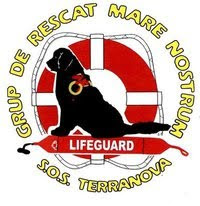Subvalvular Aortic Stenosis ("SAS") is a canine heart defect characterized by a fibrous ridge located below the aortic valve. Affected dogs are at risk of developing heart valve infections, congestive heart failure or sudden death, and severely affected dogs have an average lifespan of 19 months.
Recently, there was hope that a "study" contributed to in part by the Newfoundland Club of America had resulted in at least a predictive test for dogs carrying the genetic mutation that is believed to cause SAS. Indeed, no sooner had the talk by the N.C State researchers at the Newfoundland National Speciality show been completed than the NCA mouthpiece, Marlylou Hoffman Zimmerman (that's right, the pagan-nativist, aka "Newflady") claimed that based on the talk given by the N.C. State vet, the way Newfoundlands would be bred had forever changed. She claimed (a now deleted post) that genetic testing for SAS now existed.
Is this true? Well you can view the talk by the NCA-sponsored cardiologist (on YouTube) and not find any such evidence. In fact, he has published nothing in connection with the "talk" at the specialty, much less a peer-reviewed study. In the field of law, we call this "junk science" - claims that cannot withstand scientific scrutiny within a given medical (or other) specialty.
What, if anything, did the talk reveal? What the researchers claimed to have is a gene that co-segregates with the disease, meaning that the dogs in their sample with the gene are likely to have SAS, and those who do not have the gene are not likely to have SAS. This is in no way, shape, or form, a test in the same vein as the test for, for example, cystinuria.
What also remains unknown is whether the mode of transmission of SAS is dominant with incomplete penetrance or recessive with incomplete penetrance. Nor do the researchers know the pathophysiology of the disease (i.e., how having the alleged gene leads to the disease). This is significant in determining whether there might be a direct genetic test (actually detecting the disease producing gene) or a "marker" (another gene which lies very close to the disease gene and is usually inherited along with it). In short, despite the claims of the Pagan-Nativist, there is absolutely nothing to suggest even a claim that this is a mildly predictive test.
In point of fact, there is no genetic test that could provide clearances, through OFA or otherwise. Lest you harbor any belief in the claims of the NCA mouthpiece, I urge you to take a look at the presentation and decide for yourself.
In addition, apparently the N.C. State researchers were at the national specialty in order to conduct echo-dopplers on Newfoundlands. It turned out that the echo-dopplers consisted of a five (5) minute test for something like $50. This speaks volumes as to their credibility, as no ethical cardiologist would conduct a 5 minute echo-doppler and conclude anything from it. It was more in the nature of a McDoppler than anything truly scientific. The many claims of misdiagnoses that have been made bear this out.
At the national specialty, these same N.C. State vets were collecting swabs for DNA for SAS mutations, for $51 per dog. Was their "test" one that demonstrated a genetic marker for SAS or one that actually demonstrated the presence of SAS? Neither. One attendee decided to "experiment" - assuming that if the test was ever proven, published and peer reviewed, and were it actually diagnostic, she would never get it for a mere $51 again! So she provided DNA from a 4 month old puppy who had been cleared by auscultation by a cardiologist and 2 vets at 10 weeks of age. Then she submitted a swab on an adult, known to have moderate to severe SAS by three echo-dopplers, by different vets, over the years. In order to avoid bias, she did not reveal the prior testing of the adult or the diagnosis of SAS. What did the NCA-sponsored researchers find? Their report was that the adult was negative for whatever genes they are looking at. Yes, the adult had significant SAS but the researchers cleared the SAS-laden dog for the "gene" they had "discovered" that would identify SAS in a given Newfie.
This is the break-through claimed by NCA via Marylou Hoffman Zimmerman. Just a single sample submitted to the researchers for the so-called novel and breed-changing test demonstrated that the "test"is clearly not diagnostic, or predictive, or anything else.
The most recently published article on SAS in Newfoundlands is "Genetic Evidence of Subaortic Stenosis in the
Newfoundland Dog" (S. B. Reist-Marti, G. Dolf, T. Leeb, S. Kottmann, S. Kietzmann, K. Butenhoff, S. Rieder).
It summarizes the state of the art as follows: "Subaortic stenosis (SAS) is a cardiac disorder with a narrowing of the descending aorta below the left ventricular outflow tract of the heart. It occurs in several species and breeds. The Newfoundland is one of the dog breeds where it is more common and usually leads to death at early adulthood. It is still discussed to which extent SAS has a genetic background and what its mode of inheritance could be. Extensive pedigree data comprising more than 230,000 Newfoundland dogs from the European and North American population reaching back to the 19th century including 6023 dogs with a SAS diagnosis were analysed for genetic factors influencing SAS affection. The incidence and prevalence of SAS in the analysed Newfoundland population sample were much higher than those reported in previous studies on smaller population samples. Assuming that some SAS-affected dogs remained undiscovered or were not reported, these figures may even be underestimated. SAS-affected Newfoundland dogs were more often inbred and closer related to each other than unaffected dogs, which is an indicator for a genetic background of SAS. The sex had no significant impact on SAS
affectedness, pointing at an autosomal inheritance. The only simple mode of inheritance that fitted the data well was autosomal codominant with lethal homozygosity and a penetrance of 1/3 in the heterozygotes."
Apparently, no mention was made of this study or many others by the NCA sponsored vets - although they did mention their own 1976 study. Instead, they claimed to have a test which through DNA would demonstrate the genetic anomaly that causes SAS. Hoffman-Zimmerman came out of the blocks with wild claims that turned out to be wholly unfounded and shortly thereafter refuted by the results of a single "test" clearing a dog with moderate to severe SAS.
Hopefully, researchers will in fact eventually discover genetic testing for SAS. The question will then become whether breeders will use such tools, as many continue to breed from dogs known to throw SAS. Many of these same people continue the folly that they are breeding in order to improve the breed. More on this in a discussion of our precious boy, Primo, whose breeder assured us that he had been cleared by echo-doppler. Just two days later when he arrived, he was diagnosed with Grade 5 SAS and passed away only a few months later. Both parents continue to be bred by this "reputable" breeder.
Wednesday, June 12, 2013
Subscribe to:
Post Comments (Atom)





































6 comments:
Thank goodness someone has spoken out. What a sham - I was there. All the appearances of caring yet in the end, nothing.
Heidi
My hopes too ran high. A severe disappointment and let down.
CeCe
I too was very let down. As important as research is, this was a debacle.
I echo (sorry) the other comments and hope the committee gets to the bottom of this.
Barb M
A hood wink
This is a sad tale indeed.
Post a Comment